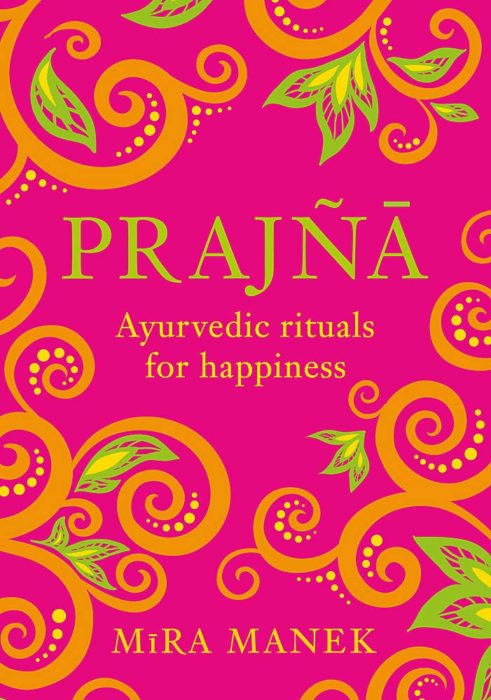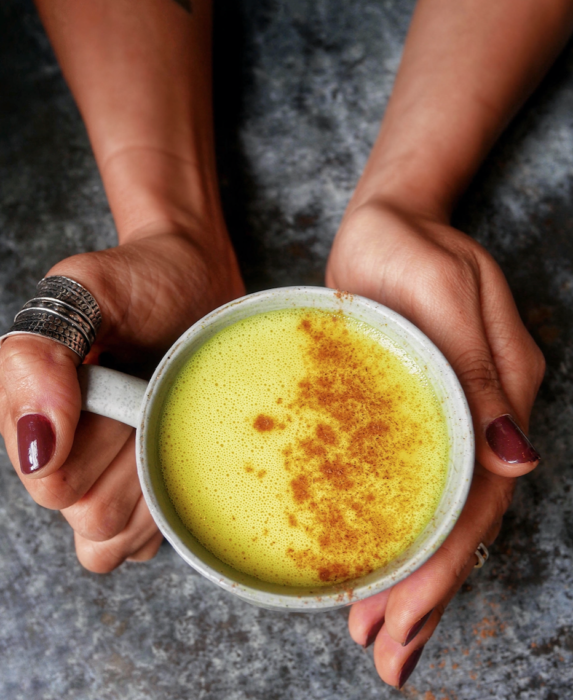Ayurvedic Rituals For Happiness By Mira Manek

We’re living in uncertain times, between the covid-19 pandemic and it’s disproportionate impact on people of colour to the job insecurities that many are facing, in particular those who work in the beauty industry. There is no doubt that these are stressful times. Finding balance and harmony feels like an impossible ambition, but perhaps the answers to coping with our modern day problems lies in ancient solutions. Here, Ayurvedic expert and author Mira Manek shares with us her journey to a healthier, happier way of living and how the ancient Indian healing system of Ayurveda can help us to better cope with stress and find balance and happiness too.
Tell us a little bit about yourself and your career?
My personal journey is very much tied into my food and wellness journey. I found yoga around a time that I was at my lowest, when I was about to embark on the end of a very long marriage and divorce period, when I really didn’t know which part of the world I was living in and my mind was as scattered as my belongings.
My personal journey is very much tied into my food and wellness journey. I found yoga around a time that I was at my lowest, when I was about to embark on the end of a very long marriage and divorce period, when I really didn’t know which part of the world I was living in and my mind was as scattered as my belongings.
It all started with the realisation that the food I had grown up eating, healthy Gujarati food that my mother, my aunts and my grandmother had cooked for so many years, was in fact incredibly nutritious, balanced and healthy. During my university years and beyond, I had lost this in chasing thinness and thinking low fat and other diets were the answer to everything. Little did I know about the importance of nutrition, vegetables, spices – even just cooking my food – even though I clearly recall my mother trying to make me understand the damage I was doing to myself. Well, that’s where it began, and the journey for the past six or seven years has been interesting, unraveling beautiful things, leading me to write two very different books and launch an Ayurvedic café in Soho.

Tell us about the book?
Prajna weaves together elements of Indian philosophy, principles of Ayurveda, simple recipes to cook everyday, the power of breath-work (pranayama), morning yoga and deep evening stretches. It is interspersed with my own thoughts and journey, bringing India to life through small anecdotes and moments of inspiration. It’s a book, a gift to yourself and to others, of wellness, lifestyle and rituals inspired by Eastern traditions.
What inspired you to write this book?
Prajna is my second book, a culmination of my entire journey, all my travels in India, studying Sanskrit at school, the beautiful landscape of spirituality in India, which I’ve only really touched the surface of, the depth of silence, the root of mindfulness, and of course Ayurveda, the rituals I grew up with and have incorporated in to my life over time, rituals that became my toolkit for survival and rituals which now keep me grounded, lifted and happy. There are various recipes in Prajna, for morning, afternoon and evening, delicious everyday recipes using spices gently, healing the body and fuelling the mind.
What is Ayurveda?
Ayurveda, a Sanskrit word meaning the knowledge, science or scripture of life, is the basis of traditional holistic medicine in India. The teachings of this scripture are as relevant today as they were thousands of years ago. Ayurveda is one of the world’s oldest medical systems developed by ancient seers, sages and natural scientists based on the premise that humans come from nature and from the universe, therefore our bodily rhythms and wellbeing are intrinsically linked to it.
At the heart of Ayurveda is balance and living in tune with nature. When you eat, i.e. having your largest meal at lunchtime when the sun is at its strongest and therefore your digestive fire or agni is also at its strongest – is just as important as what you eat and how much you eat, movement and yoga go hand in hand with food, and keeping the mind at ease and not allowing for stress is an essential part of the package. Thus, it is a lifestyle comprising of and connecting the elements of mind, body and spirit at the level of consciousness, a lifestyle that is wholesome, pure and nourishing. It is practical science intertwined with a philosophy whose overarching principle is to live a more sattvic life by instilling daily rituals to bring about balance, prevent disease and promote longevity – all of which create and fuel happiness.
What does Prajna mean?
Prajna is a Sanskrit word meaning ultimate wisdom. It is made of two parts, pra meaning ‘before’ or ‘supreme’ and jna which means ‘knowledge’ or ‘consciousness’. It is translated as intuitive wisdom, root knowledge and deep understanding. Prajna is accessed from stillness, akin to the concept of shunyata, nothingness, where thoughts and events of the mind are observed and noted without any connection to stories or experience, without any presuppositions, not connecting a past occurrence with the present moment, just living here.
The realisation of this life as a game, being a part of it, yet able to step away and observe it, equips us with the knowledge of this world as an experience and gives us perspective. It’s like having a cloud removed from our head and seeing the blue sky. The colour and intensity of emotion is still alive, but there is now a sense of freedom, lack of fear and a passion for living. Prajna is higher wisdom, spiritual insight and the truth of awakening. It is not the knowledge of God or religion, it is not intellect, nor is it being pious and praying, though it could encompass all this.

How can Ayurvedic rituals enhance wellbeing – physical and mental or emotional health?
Ayurveda is as much about when you eat as it is about what you eat. Understanding your own body, that your body is different to another body and working with this is supremely important (this is also related to dosha type).
Eating seasonally: we come from nature and therefore are attuned to it. Why do we crave warming hearty foods in winter and lighter foods in the summer months? Having less raw foods generally, especially in the winter months, is important. But again, it’s all to do with the climate you live in.
Lastly, mindful practices, listening to your thoughts, practicing being present wherever you are and whatever you’re doing goes hand in hand with healthful practices. Mindfulness and healthfulness together create a package of happiness and wellbeing.
Your book is sectioned in to 3 categories; ‘Morning, Afternoon and Evening’. Can you tell us why and how our readers can use these principles to help cope during these unprecedented times of stress and social-isolation?
Weaving rituals into our day-to-day life, especially right now, ensures that we start the day in an uplifting way. Noting our thoughts and including gratitude first thing in the morning, doing breath-work exercises to balance our minds and bring us into our calm parasympathetic nervous system will always lift us when we’re feeling a little low. Even a quick 10 minute walk outside, in the garden or anywhere to get some fresh air and oxygen can help. An online yoga or gym class, something you know you’ll love, to get the endorphins kicking in or maybe scheduling a call with a friend everyday to keep you connected – creating your own daily and weekly list of practices, rituals and activities.
I’ve just created an easy to use ‘Ritual Journal’ below is the ‘afternoon ritual’ but the full journal is is free to download from my website, and is the perfect thing for this time of social isolation.
AFTERNOON RITUALS
(take 2 x 20 minute breaks)
CONNECT
Think about what you love doing? Do you love interacting with people and friends? With the current situation of social distancing, perhaps schedule a 20-minute call with a few friends, so it brings some energy and positivity into your afternoon.
CHAI
Schedule a break – maybe make chai or turmeric milk or whatever you like during this 20-minute break. Do you have a favourite mug or bowl – something that makes you happy/ brings you comfort? Use that!
STRETCH
Have you been sitting in the same position at your desk or on your laptop? Take a few minutes to roll your shoulders back, to rotate the neck and relax the jaw. Release the hips by sitting in a squat position for a minute if you can.
WALK
Would a 10-minute brisk walk motivate and energise you? Then do this, followed by a 10-minute stretch.
STILLNESS
Quick Meditation – just to bring your thoughts back to the present moment, to come back to the breath and say your affirmation out loud. Maybe get some fresh air while you do this.
What immune BOOSTING recipes would you recommend?
Turmeric is a root which contains curcumin, an anti-inflammatory active compound which inhibits molecules that cause inflammation in the body, in turn helping to boost immunity.
-Inflammation in the body is associated with chronic diseases such as heart disease, Alzheimer’s, cancer and diabetes. Research has found that even a small amount of curcumin in your diet can significantly improve antibody release in your body. Turmeric also reduces histamine levels in certain conditions such as colitis, cold sores, asthma and arthritis. Curcumin has antioxidant properties, which help to prevent free-radical damage, again boosting immunity. Furthermore, turmeric helps to detoxify the body, aid digestion and support the joints.
Ginger is another herb with considerable amounts of healing properties. Gingerol is one of 115 different compounds in ginger and considered to be the most therapeutic. It provides anti-inflammatory, antiviral, antioxidant and anti-bacterial properties. Ginger also helps cleanse the lymphatic system, which helps prevent the build-up of toxins in the body.
Lemon and lime juice contain a high amount of vitamin C, which is great for the immune system. They are also alkalinising, thus preventing toxins from being created when the body is too acidic. Lemon juice is also an antioxidant and helps to cleanse the liver and digestive system.
Honey is rich in antioxidants, which help protect the body from free radical cell damage. Free radicals help contribute to ageing as well as chronic diseases such as cancer and heart disease. Honey also has antibacterial properties.
A shot: a daily shot of the above has a high amount of antibacterial and antiviral properties, great for boosting your immune system and helping protect against colds and flus.
Here are some daily tumeric and Ayurvedic herbs drinks to help boost your immunity with turmeric.
RECIPES
1
Golden Chai
Ingredients:
1 mug of any milk you like
½ teaspoon ground turmeric
¼ teaspoon ground ginger
½ teaspoon ground cinnamon
a pinch of ground black pepper
Method:
This is similar to the spicy turmeric/ golden chai we have at my cafe, simply boil all the above together for a few minutes and enjoy.
2
Lime Tonic
Ingredients:
Juice of 5 lemons or limes
1 inch ginger root
1 inch turmeric root (or powder)
1 teaspoon cumin seeds toasted lightly in a pan
Method:
Blend all the above ingredients together and keep this in a jar and drink during the day, add 2-4 tablespoons in a mug of hot water and stir in some honey. Great for immunity and digestion!
Follow: @miramanek
